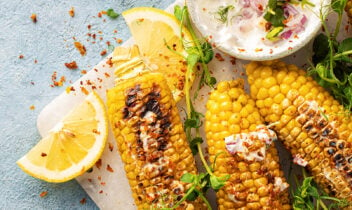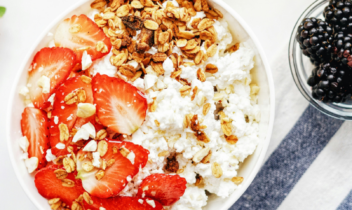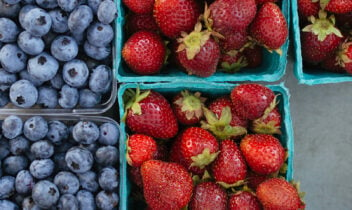
Savor Self-Care
Mindfulness and self-care trends are growing and I, for one, hope it keeps growing. Taking care of yourself is not just enjoyable, but plays an important role in managing our mental and emotional well-being. This concept of self-care can apply to many areas from skincare and fitness to meditation and setting personal and professional boundaries. Self-care is much more than a little pampering and while often forgotten, self-care includes the foods we eat.
In an effort to make May more mindful, let’s explore our relationship with food and how what we eat can impact our physical and mental health. We can dedicate this month to caring for ourselves inside and out, and work to create a mental shift that helps us continue prioritize self-care for many months and years to come.
The Mindset
The great part about mindfulness and self-care as it relates to food is really the shift in mindset. Rather than rules and restrictions, we can consider how our food makes us feel and what it does for us. Imagine these sweet treat scenarios.
- A cupcake is going to taste great and satisfy that sweet craving in the moment. The joyful emotion we connect to a cupcake comes from its flavor, as well as the memories and experiences we associate with it, like birthdays and childhood. Honor that. It’s okay. Cupcakes aren’t out to get you. How it’ll make you feel an hour later will likely depend on the size of the cupcake, so take it slow and relish it. The occasional cupcake can be self-care.
- Watermelon slices will also taste great and satisfy our sweet cravings immediately. Many of us associate the fruit with summer, backyard cookouts, trying to see who can spit seeds the furthest. In addition to its sweet juicy flavor, watermelon provides some hydration, fiber, vitamin C and antioxidants. We will probably feel pretty good afterwards, even if we went back for seconds, or even thirds. This too is self-care.
The Plants
While there is no mental health diet, an overall healthy diet with a diverse selection of plants can offer a wide array of nutrients that may help give us a little lift. Maybe not the lift we’d get from a week-long Caribbean spa retreat, but incorporating adequate intake of these nutrients won’t require a trip to the airport.
- Omega-3 fatty acids – These heart-healthy fats are associated with lower rates of depression and are being researched as an emerging treatment for a variety of mood disorders. While omega-3 fatty acids are most commonly associated with fatty fish like salmon and tuna, there are plant-based options as well. Try incorporating omega-3 rich plants into your day with nuts and seeds like walnuts, chia, hemp hearts, ground flax, as well as some leafy green vegetables like spinach, brussels sprouts and broccoli. Seaweed also provide options for enjoying more omega-3 rich plants.
- B Vitamins – Many B Vitamins like folate, B12 and B6 are involved in hormone production including mood-stabilizing serotonin and sleep-supporting melatonin. While a diet rich in fruits, vegetables, nuts, legumes and whole grains will cover most B vitamins, B12 primarily comes from animal sources. Nutritional yeast and fortified foods like cereals and plant milks can help fill in the B12 gap.
- Minerals – Minerals like selenium, magnesium and iron are also associated with our mental well-being. These minerals may play a role in both cognitive and emotional health. Minerals such as these can be found in a variety of plant-based foods including whole grains, dark leafy greens, tofu, legumes, nuts, seeds and fortified cereals.
- Probiotics and prebiotics – We continue to learn more and more about the role of gut bacteria and its impact on our health. In particular, gut bacteria plays a role in the production and signaling of various hormones that impact mood and stress levels. While there is still a lot to learn in this area, incorporating probiotic-rich foods with live active cultures has many well-known health benefits. Additionally, eating a variety of fiber rich plants can provide those gut microbes with the prebiotic fuel they need to thrive.
Next time you’re shopping for produce and wishing it was cupcakes, think about how all these foods will make you feel. Maybe add a new and different plant to your cart to add variety that will be interesting to you and your gut. Or maybe you’ll notice some beautiful spring produce and load up on berries, asparagus, and snap peas to celebrate the season. Maybe you will go ahead a treat yourself to some watermelon, a cupcake or both. It can all be self-care.
A balanced and varied diet filled with delicious and satisfying foods may support our physical and mental well-being, but it may not be enough for everyone. According to the CDC, 1 in 5 US adults experiences mental illness in a given year, and many go without treatment. If you are struggling, know you are not alone and don’t be afraid to ask for help.


